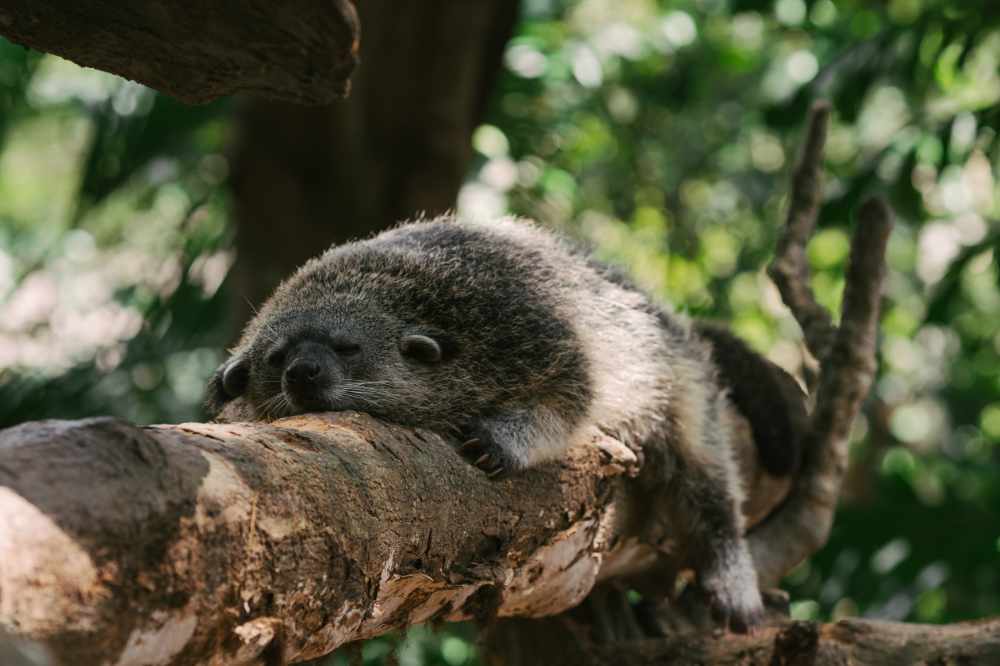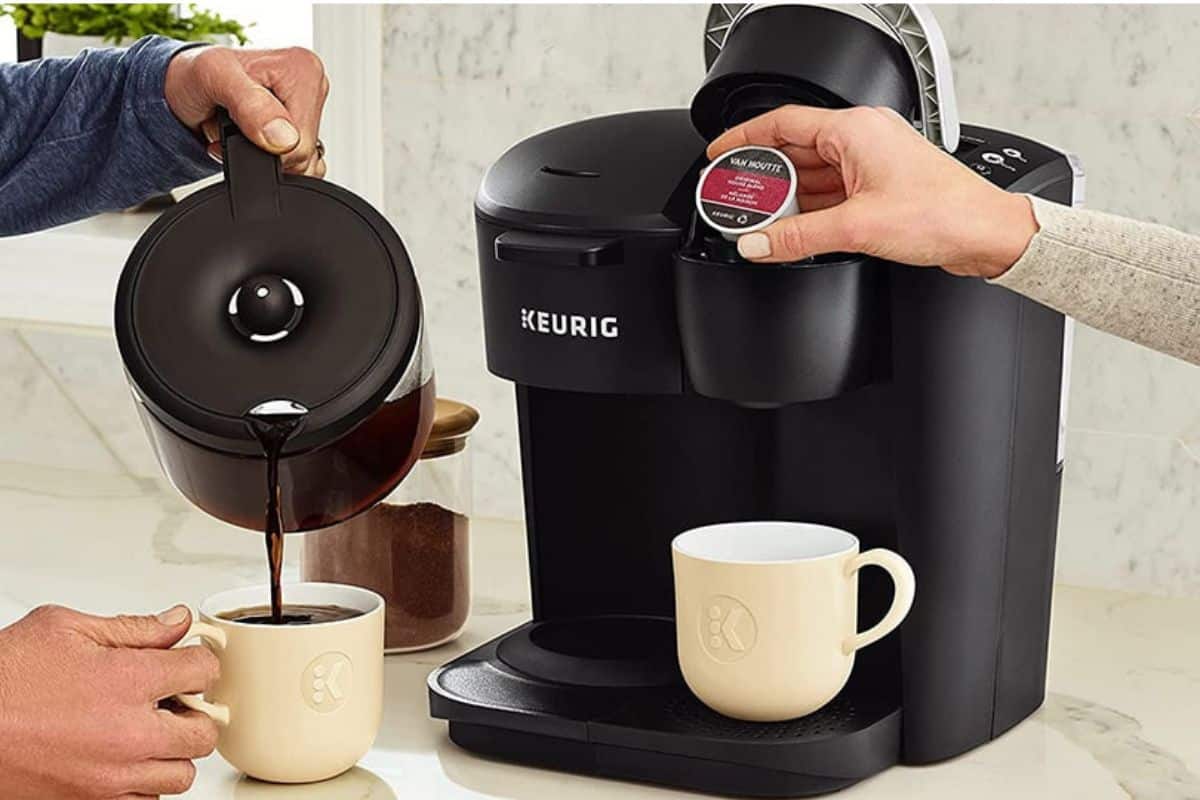If you are looking for one of the most expensive coffees in the world, look no further than monkey poop coffee. Monkey poop coffee sounds like a joke, but this is actually a thing in the coffee world. However, the term “monkey poop coffee” is often used interchangeably for two different types of coffee.
Monkey poop coffee can refer to the coffee beans processed by the rhesus monkey’s saliva. Or, more commonly, it can refer to coffee beans that are found in a civet’s droppings. So, one coffee has the monkey, and the other has the poop.
Civet cat coffee, also known as monkey poop coffee or Kopi Luwak, is made from the partially digested coffee cherries which are found in an Asian palm civet’s excrement. However, the high price tag is a turn-off for many. Just one cup of this coffee could set you back 35 to 100 dollars.
So, why does something made from poop cost so much? And, is Kopi Luwak safe to drink? Read on and we’ll answer your questions about this rare specialty coffee.

It’s a monkey! It’s a cat! No, it’s Kopi Luwak!
So, we’ve heard of monkey poop coffee, cat poop coffee, civet cat coffee, civet coffee, weasel coffee, bucket list coffee, Kape Alamid, and Kopi Luwak. But, all these terms can mean the same cup of coffee which makes things more confusing.
We’ll try to draw clear lines between monkeys, cats, civets, spit, and poop. Here goes…
Civet Cats, Poop, and Coffee
We know what monkeys, weasels, and cats are, but what’s a civet? A civet is an omnivorous mammal that lives in Asia, Africa, and southern Europe. It is not related to either monkeys or cats, but, instead, is most closely related to a mongoose.
The Asian palm civet looks a bit like a combination of raccoon and a weasel with a long fluffy tail like a cat. Civets spend much of their lives in trees like monkeys and hunt at night.
The civet eats small snakes, small birds, insects, rats, and fruits. They are picky eaters so when they find coffee berries, they only eat the very best of the crop. The coffee goes through their digestive tract and the coffee beans are collected from the civet’s feces.
The official name for this high-dollar coffee is Kopi Luwak. In Indonesian, “kopi” means coffee and “luwak” means civet. So, put together, it means: “civet coffee.”
A civet is native to Asia, and the Indonesian islands Sumatra, Bali, East Timor, Sulawesi, and Java are the main producers of this high-dollar coffee. While Asia has been the biggest consumer of monkey poop coffee to date, this coffee trend is catching on in the Western world, as well.
So, How Did This Monkey Poop Coffee Trend Begin?
Facebook and Tiktok are full of teens and influencers trying to start a new trend. Some of these trends can come with tasty results such as the “The Charli” drink at Dunkin Donuts or the Pink Drink at Starbucks. Then there are those with a death wish who go around licking toilets or sucking on tide pods.
So how did the monkey poop coffee trend start? And, is the result tasty or dangerous?
While Americans started catching wind of monkey poop coffee in the 1990s, and it was further advertised by Hollywood in the Bucket List, kopi luwak has been around much longer. History tells us that this unique coffee got its start in the 1800s as a result of Dutch trading in the East Indies.
Indonesia, Dutch Traders, and Coffee Plantations
Coffee from Indonesia and other parts of Southeast Asia became a desirable commodity and coffee growth and processing became regulated for quality by the Dutch. The regulations meant that many native Indonesians who had grown up drinking coffee were no longer able to afford the beans. However, there was a loophole in this tight trade.
While much of the coffee from a local plantation was destined for export, the coffee beans that had been eaten and pooped out by a civet were available and free. This meant that those who chose to hunt down civet poop in the wild could gather and clean the coffee beans to drink. Hey, desperate times call for desperate measures!
But, actually, this wild coffee processed in the belly of a civet was even better than the beans processed on a coffee plantation…
Is Monkey Poop Coffee Any Good, Though?
While monkey poop coffee doesn’t sound very tasty, it is purportedly one of the most delicious coffees available to mankind. So what makes kopi luwak good?
Civets are known to be picky eaters, and when it comes to hunting down their Arabica coffee, they are no different. Coffee beans are not beans at all but the seed of the coffee cherries. This fruit is appealing to civets and they will only pick the best and ripest fruits available.
When the coffee cherries enter a civet’s stomach these choice berries are fermented and “processed” by digestive juices. This fermentation process is key to creating the sweet and smooth flavor profile of the bean.
Once the civet has eaten the coffee fruit it passes the whole coffee beans in its feces. The feces are then collected and cleaned until only the coffee beans remain. (No, you won’t be drinking any poop.)
The Flavor profile of a Cup of Kopi Luwak
Kopi Luwak coffee is low in acidity since the digestive enzymes process out much of the bitterness and acid found in the coffee beans. This natural fermentation that takes place in the civet’s stomach leaves the beans with an excellent flavor profile.
Kopi Luwak’s flavor descriptors include: smooth, earthy, syrupy, nutty, musty. Some even say they can taste the jungle in these beans! This coffee has no hint of bitterness and includes a chocolate and caramel aftertaste. Ok, now that sounds yummy…
Most coffee roasters will choose a light roast for civet cat coffee. This way, all those intricate flavors stay in the beans.
Is Civet Coffee Safe to Drink?
So, maybe it tastes great, but are coffee beans that have gone the full circle through the digestive process safe to drink?
Yes, after the coffee beans are collected from the civet scat they are double washed and laid out to dry in the Indonesian sun. Then coffee roasters will roast the beans at temperatures of at least 400 degrees Fahrenheit. This processing effectively cleans the coffee beans so you don’t have to worry about E. coli or any other kind of bacteria in your cuppa.
What Makes Monkey Poop Coffee so Expensive?
If someone told me they sourced a drink from poop, I think I would expect them to pay me to drink it. However, coffee drinkers will shell out big bucks for a taste of this rare coffee. A cup of Kopi Luwak coffee could cost you between $35 and $100 for one cup. Or, if you want to buy the beans, they can cost anywhere between $100 to $600 a pound.
Kopi Luwak is expensive because the demand for this specialty coffee is higher than the amount of coffee that can be produced. Civets can only physically eat so many coffee beans. Then these beans have to be hunted down in the wild and extracted from poop. The beans have to be thoroughly cleaned and only then
This is a much more labor-intensive way to retrieve coffee than coffee farmers who grow and harvest your average coffee bean directly from a plantation.
Don’t Go the Cheapest Route
If you find a cheap version of civet cat coffee, this could be an indicator that the coffee is unethically sourced. Or it could even be just a bag of regular beans passing themselves off as something fancy. As with most things in life, you’ll probably get what you pay for.
The Best Way to Prepare Monkey Poop Coffee
If you are going to pay the high prices for ethically sourced cat poop coffee, you are going to want to get all the flavors out of those beans. While I am a fan of espresso, this won’t be the best way to prepare monkey poop coffee. This brewing method is too fast and will miss a lot of the more delicate flavors in your beans.
A pour-over method is one of the best ways you can prepare these lightly roasted beans. With this method, you are sure you are getting all those great coffee tastes out of your expensive brew.
The Controversy Surrounding Civet Coffee
Monkey poop coffee isn’t the prettiest name for a coffee, but, the taste of this coffee is delicate and sweet. However, the story behind monkey poop coffee in today’s market has started to smell a little fishy…
In the beginning, the monkey poop coffee trade was good for the civet cats. Where they had been looked upon as thieving pests that went around robbing the best coffee beans, they suddenly became the hero of the hour. Civets brought in a new and pricier coffee market and those in the coffee business could make an even better profit.
But, it seems that money was the root of all evil. Unfortunately for the civet, the market demand for their coffee poop became too high for sellers to keep up. This led to many wild civets being captured and placed in small wire cages where they are force-fed coffee beans.
Wild civets are by nature solitary, omnivorous, nocturnal animals that like their peace and quiet. So, the cramped, crowded quarters and high caffeine intake can quickly cause their health to decline in captivity. As a byproduct, the coffee being produced under these circumstances is also of lower quality.
So far, the monkey poop coffee market is largely unregulated, and “truth in advertising” is not a big concern. This means that customers can pay high prices for kopi luwak coffee from free-range wild civets, but that may or may not be what they will get. The burden is placed on the customer to find out which civet coffee is ethically produced and the real deal.
Can You Find Kopi Luwak at Starbucks?
Rumors have gone around that some Starbucks stores stock kopi luwak coffee. However, this rumor is unfounded. While Starbucks may have had tastings of kopi luwak, the stores do not keep this type of coffee in stock or sell it at the coffee bar.
If you want to try Kopi Luwak coffee, you can check into specialty coffee stores in your area. You can even find this specialty coffee in online stores or on Amazon. However, to be sure you are getting ethically-sourced coffee, and not just a name on a label, it is a good idea to do some research on your brand before buying.
Unfortunately, the market for Kopi Luwak is not regulated. This leaves the door open for shady ethics and false claims. Some coffee companies sell regular coffee as kopi luwak or mix only 5-20% of kopi luwak coffee mixed with regular coffee beans. Others claim that they source their coffee beans from wild civets, however, these claims are not always substantiated.
Many genuine Kopi Luwak farmers are proud of their craft and will have pictures of their coffee farm, coffee production, and the roasting process. If the coffee producer has only a simple website with a few stock photos, this could raise some red flags about their authenticity and ethical standards.
Other Animal Poop Coffees
While civets and monkeys can make a great cup of coffee, they are not the only wild animals with this talent. Monkeys, bats, birds, and elephants also seem to have an addiction to our favorite bean.
Monkey Coffee
Monkey coffee is sometimes also called monkey poop coffee. However, this coffee has nothing to do with poop, just spit. The Rhesus monkey lives in Chikmagalur, India, and Taiwan. These animals enjoy munching on fresh coffee berries, but they don’t swallow the beans, they just spit them out.
Similar to the civet cat’s coffee, the digestive juices involved in this process will turn your coffee bean into something smooth and sweet. You could spend over $300 per pound to taste this coffee made from a Rhesus Monkey’s saliva.
Bat Poop Coffee
So, bats have definitely gotten a bad rap these last few years. But, in Madagascar and Costa Rica, these winged furry creatures help out with the coffee market.
The artibeus jamaicensis, er… fruit bat, bites into a mutation of the arabica coffee species known as Bourbon Pointu Coffee. It then licks out the sugar from the fruit and as a byproduct, changes the flavor of the coffee bean. (There’s no poop involved in this coffee either.) If you’re not put off by bats, you can buy a pound of this fruit-bat-spit-coffee for a little over $100.
Elephant Poop Coffee
Elephant poop coffee is also called black ivory coffee and is currently the rarest coffee in the world. Wild elephants in Thailand consume arabica coffee cherries and then the processed beans are left behind in these herbivores’ dung. Some brave souls collect the beans and process them into possibly the most expensive type of coffee at $500 per pound.
Many describe the flavor profile of black ivory coffee as smooth and grassy. You can taste malt, spice, and chocolate in this cuppa as well.
Bird Poop Coffee
The Jacu bird lives in Brazil and likes to eat coffee beans as part of his herbivore diet. The fruit is digested and then the beans are left behind in the bird’s poop. As with other types of bird and spit coffee, the fermentation involved in the digestive process gives this coffee a distinct flavor profile. Many describe bird poop coffee as a full-bodied, nutty brew with a taste of aniseed. A pound of this unique coffee can cost over $300.
Wrap Up
So this was kind of a wild tale that started out with wild animals, then heads into poop and spit. Those who have tried it say, that by “the end” you will have a cup of coffee that is unrivaled for its sweet and smooth flavor.
However, if you have your wallet ready to try a pound of kopi luwak, (or any other kind of poop or spit coffee) it’s a good idea to double-check the coffee source. This ensures that your money is rewarding the coffee producers who source their beans ethically from wild civets. Also, it will prevent you from paying high prices for just a fancy label.





